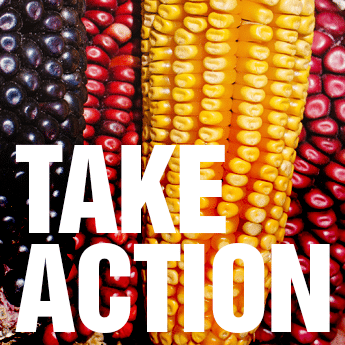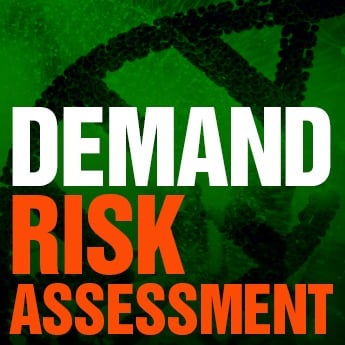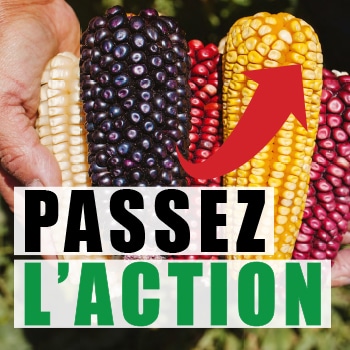Low Level Presence (LLP)
Legalizing contamination from unapproved GM foods: Low Level Presence (LLP) is a policy proposal that would accept contamination of our food system with a low level of genetically modified (GM) foods that have not been approved by Health Canada as for safe human consumption. This would allow GM foods to contaminate imports to Canada even if they have not yet been approved as safe by Canadian regulators, but have been approved as safe in at least one other country that is deemed trustworthy by Health Canada (conforms to international Codex guidelines). The federal government argues that this “low level” of contamination from unapproved GM foods is not harmful. In 2018, Canada signed a new trade agreement with the US and Mexico (CUSMA) where all three countries agree to establish a Low Level Presence (LLP) policy. In 2011, Agriculture and Agri-Food Canada held consultations on an LLP proposal that would have allowed 0.2% or higher of LLP.
Updates
August 2019: Read Health Canada’s response to our letter expressing concern over an LLP policy that would remove the role of Health Canada as safety evaluator for GM foods (June 2019). This concern was raised by CBAN in testimony and a written brief to the House of Commons Standing Committee on Agriculture and Agri-Food which concluded its study on the “Public perception of and public trust in the Canadian agricultural sector” without making any recommendations.
May 11, 2019: Ministers of Agriculture from Argentina, Brazil, Canada and the United States issued a joint statement on LLP whereby they “commit to heighten collaborative work with third-party countries in 2019, and continue advocating for global approaches for the management of LLP that are practical, science-based, predictable and transparent. These efforts will include the universal use of international science-based guidelines.”
2018: The new trade agreement with the US and Mexico (CUSMA) obliges Canada to create a “Low Level Presence” (LLP) policy: “Each Party shall adopt or maintain policies or approaches designed to facilitate the management of LLP occurrences.” Establishing LLP policies around the world is a major objective of the biotechnology industry and the USMCA requires the US, Canada and Mexico to set the global example. If our trading partners have Low-Level Presence policies, these countries will accept exports from Canada even if they are contaminated with a “low level” of GMOs that regulators in those countries have not yet approved as safe. The first step to getting other countries to accept GM contamination from Canada is for the Canadian government to accept GM contamination in food imports coming from other nations.
2017: Canada has developed a policy model on “Managing Low Level Presence of Genetically Modified Crops in Imported Grain, Food and Feed” in order “to stimulate domestic and international discussions”. This policy model appears to replace earlier (2011-2015) policy proposals for implementation in Canada.
April 2018 – CBAN Article: Setting up a Spiral of GMO Contamination: Legalizing “Low-Level Presence” of Unapproved GMOs
Published in British Colombia Organic Grower, Volume 21, Issue 2. Spring 2018.
Background
What is “Low Level Presence”? “Low Level Presence” (LLP) is the proposal to allow our food to be contaminated by a percent of genetically engineered foods that have not been approved for safe eating by Health Canada, but that have been approved for human consumption in at least one other country. Health Canada would create a list of trusted government regulatory systems and accept LLP contamination originating from those countries. LLP would change Canada’s existing “zero-tolerance” policy for such contamination in imports to Canada. LLP is different from “adventitious presence” which is the industry term for contamination of our food by experimental GM crops and animals that have not been approved anywhere in the world.
Which other countries have LLP? Canada would be the first country in the world to allow LLP. Currently, every country has “zero-tolerance” for contamination from GM foods that they have not approved as safe. In July 2011, the European Union allowed up to 0.1 percent of animal feed could be contaminated by GM grains that are not approved in the EU.
What is the Canadian government’s rationale for LLP? LLP is a trade policy. The grain industry operating in Canada wants other countries to establish LLP so that they do not reject exports from Canada that are contaminated by GM foods they have not yet approved: “In the industry’s view, Canada could serve as a model to influence countries with trade-restrictive LLP policies by adopting alternative domestic LLP policy approaches.” (Agriculture Canada presentation on LLP) “If trace amounts of such unapproved genetically modified product are found in import shipments, in a country where the genetically modified crop is not approved, often times these imports will be rejected…The unpredictability of rejection of such imports is a growing concern, given the potential economic impacts low-level presence will have on global trade.” (FAQp5)
- CBAN Press Release – July 7, 2015: Canada Close to Allowing Unapproved GM Food Contamination in Imports
- CBAN’s comments: “Low Level Presence” (LLP) policy proposal, 2015
Government documents on the earlier policy proposal:
- Frequently Asked Questions and Background from Agriculture Canada.
CBAN’s Analysis
LLP is unacceptable and unjustifiable from a health and safety point of view:
- LLP is trade policy at the expense of public health protection. The goal of LLP is to accept GM contamination in imports to Canada, by removing the restriction of Canada’s own safety assessment in certain cases.
- LLP overthrows Canada’s “science-based” regulation of GMOs because LLP assumes that certain GM foods are safe before our own government regulators assess safety.
- LLP creates exceptions to Health Canada’s safety assessment of GM foods (already highly criticized as inadequate), whereby government regulators review scientific data to determine human health safety. The introduction of LLP will further undermine our international reputation for food safety as well as the confidence of Canadians in our food system.
- The LLP policy accepts that GM contamination will keep happening and opens our doors to such contamination.
More Resources
- Case Study: Agriculture Canada to remove Health Canada from safety assessment of some GM foods, by Lucy Sharratt, CBAN in The Harper Record: 2008-2015, Canadian Centre for Policy Alternatives
- Civil society statement for the FAO Technical Consultation on Low Levels of Genetically Modified (GM) Crops in International Food and Feed Trade, March 2014
- “Canada Wants the World to Relax its GMO Standards” Ashley Renders, VICE Magazine, February 6, 2014
- Report on Stakeholder and Public Consultation: Consultation on the Proposed Domestic Policy and Implementation Framework on the Management of Low-Level Presence of Genetically Modified Crops in Imports, Redfern Research, 2014.
- CBAN Testimony to the House of Commons Agriculture Committee, March 7, 2013
- Press Release, March 7, 2013: Changes to GM Food Safety Regulation Debated: Proposal for “Low Level Presence” would remove Health Canada from safety evaluation of some GM foods
- CBAN comments on LLP proposal, Agriculture Canada online consultation, January 2013
- “Low Level Presence Sacrifices Food Safety for Trade Policy: LLP is indefensible from a public health and safety standpoint” Submission to Government Consultations on LLP, from the Canadian Biotechnology Action Network, 2011
- Press Release, November 29, 2011: Federal Government Proposes to Side-Step Health Canada’s Regulation of Genetically Modified Foods: Trade policy would sacrifice safety, say groups.
- “Legalizing Contamination from Unapproved GM Food: Regulation? Who Needs it!” by Lucy Sharratt, CBAN, November 2011
- Government report from September 2011 consultations (released December 2012).






